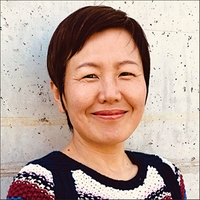Grass
Keum Suk Gendry-Kim, trans. from the Korean by Janet Hong. Drawn & Quarterly, , (481p) $29.95 ISBN 978-1-77046-362-2
In telling the difficult, moving story of Korean former “comfort woman” Granny Lee Ok-sun, Gendry-Kim faces a philosophical question as well as an artistic one: what can be redeemed in a life defined largely by cruelty? In swift black brushstrokes that feel both contemporary and, in key wordless pauses, classical, Gendry-Kim follows Ok-sun’s narration of her life (based on interviews) with minimal editorializing. Ok-sun—depicted as a wrinkly old woman in the present day and a round-faced, triangle-nosed girl in her youth—is sold twice as a child into domestic work (though promised she was going to school) in poverty-stricken, occupied Korea before Japanese forces kidnap her. At the Chinese outpost where Japanese soldiers rape her regularly, there is no “comfort,” just a dirty work camp where her visitors, up to forty a day, are “all the same.” When Ok-sun describes her first rape, Gendry-Kim draws six black panels with Ok-sun’s terrified face bursting out of the frame. After the war, Ok-sun finds relative peace, but it’s clear that politicians lack the power and will to enact true healing. The best anyone can hope for, Gendry-Kim seems to conclude, is to say, collectively, “This happened.” Despite occasional moments of disjointed plotting, Gendry-Kim tells Ok-sun’s powerful story with grace, artfulness, and humility; it deserves witness. [em](June)
[/em]
Details
Reviewed on: 04/11/2019
Genre: Comics


